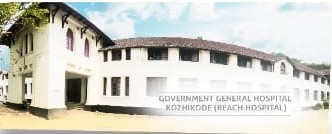Kozhikode: Kerala has marked yet another pioneering innovation in the field of public healthcare. Health Ministry along with Meitra Hospital has successfully set up the state’s first Tele-ICU at Beach Hospital, Kozhikode. Meitra Hospital will be leading the deployment of the clinical & technological expertise, while Faizal & Shabana Foundation will financially support the recurring operations of this initiative. The official launch took place on the auspicious occasion of Kerala Piravi, in the presence of Honorable Health Minister Ms. K K Shailaja, MLA Pradeep Kumar, District Collector Mr. Sambasiva Rao IAS, Superintendent of Beach Hospital Mr. Ummer Farook, District Programme Manager - National Health Mission Dr. A Naveen, Meitra Hospital Chairman Mr. Faizal E Kottkollon, Meitra Hospital CEO Dr. P Mohanakrishnan.
Government General Hospital, also known as Beach Hospital becomes the first member of Meitra Hospital’s mission to upgrade and equip healthcare with technology & bridge an acute shortage of intensivists in the country. The initiative is not just expected to address the deficient number of specialists but will offer a range of critical care facilities ensuring better health outcomes, risk - reduction of medication errors, and infection control, through pro-active round-the-clock monitoring.

“The initiative is intended to turn the healthcare system into a giant ecosystem. There is a shortage of Intensivists and the current pandemic has laid open the gap and exposed the vulnerabilities at a global level. It is the right time to leverage technological innovations to solve healthcare challenges, by giving the doctors more digital solutions in their armamentarium. Meitra Hospital has always prided itself on being at the forefront of healthcare innovations. We are happy to be partnering with the Health Ministry to bring the latest technological advancements to the state to serve the people better,” said Faizal E Kottikollon, Chairman, Meitra Hospital & Founder Chairman, KEF Holdings.
“There are more than 3 lac ICU beds, but less than 5000 intensivists in the country. The gap is huge & cannot be left unaddressed especially when it comes to life-saving critical care treatments. Technology advancements have ensured that we can now democratize quality healthcare and bring it closer to people through wider access. Our Tele-ICU setup is a proud Made-in-India solution that is at par with global standards. Our team of intensivists will monitor the Tele-ICUs from our Command Center based at Meitra Hospital which will offer round-the-clock monitoring of critical care patients. We have also trained the staff at Beach Hospital so that they stay abreast of the new technology” informed Dr. P Mohanakrishnan, CEO, Meitra Hospital.
Meitra hospital stands committed to providing quality healthcare in the country. This step towards creating a network of Tele-ICUs in the region once again reiterates its commitment towards its people. The hospital will be extending this facility to a host of other hospitals in the region to bridge the doctor-gap and make their ICUs more robust, efficient, and better adept at handling diverse kinds of critical care patients, a release said.
Let the Truth be known. If you read VB and like VB, please be a VB Supporter and Help us deliver the Truth to one and all.
Hyderabad (PTI): Telangana Chief Minister A Revanth Reddy met Union Home Minister Amit Shah in Delhi on Wednesday night and urged him to increase the sanctioned strength of IPS officers to the state in view of its growing administrative and security needs.
The two leaders also discussed the recent surrender of several senior Maoist leaders before the Telangana Police and other issues.
"During the meeting, the two leaders discussed the issue of Maoist surrenders and their rehabilitation. The chief minister informed Shah that significant improvements in policing have taken place in Telangana over the past two years," an official release here said.
Highlighting that 591 Maoists have laid down their arms and joined the mainstream of society during this period, the chief minister said the state government was providing them compensation and rehabilitation assistance as per the rules.
He requested the Union home minister to extend financial support from the central government for development works in the backward regions of the state.
Reddy also urged Shah to increase the sanctioned strength of IPS officers to the state from 83 to 105 in line with the state's growing administrative and security needs, the statement said.
The first cadre review after the formation of Telangana was conducted in 2016, while the next review, due in 2021, was delayed and finally carried out in 2025. Even then, only seven additional IPS officers were allocated to the state, the chief minister informed Shah and requested that the third cadre review be conducted in 2026 as per the schedule.
Reddy explained that Telangana, like the rest of the country, is facing several modern challenges, including cybercrime, drug trafficking, white-collar crimes, and other emerging security threats.
He highlighted the reorganisation of the Hyderabad, Cyberabad, and Malkajgiri Police Commissionerates, the proposed formation of the Future City Commissionerate and the rapidly growing population in Hyderabad to underline the increasing administrative requirements of the state.





